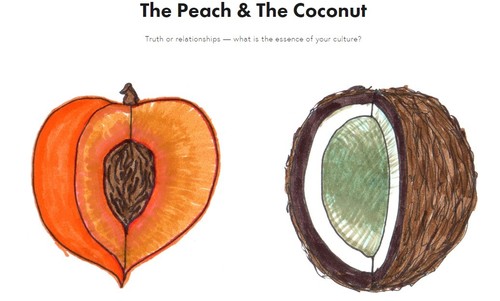When we encounter cross-cultural differences like the indirect communication style featured in my recent post on the rule of three we have a choice. You either complain about the difference and become frustrated or seek to understand it better and adapt. I have found it most useful to choose the latter. As you dig into such cultural differences, you learn a lot about the core of Chinese culture—even if making such an adjustment is uncomfortable.
Coconut vs. Peach—Two Views of Relationships
Chinese and Americans hold different views on how much overlap there is between public and private relationships—for instance, whether or not you would introduce a co-worker to your father. Dutch organizational Theorist Fons Trompenaars likened the difference between these two views on relational overlap as the difference between a coconut and a peach.

Image Source: Culture3
Coconuts: In China, overlap in relationships is diffuse. In other words, a coworker is welcomed into the network of private family relationships. Much like a coconut, once somebody breaks into the relationship they have full access to anyone in that person's network. Breaking in isn't easy; to those outside the outer shell a Chinese person may not be particularly friendly. However, once trust has been built, a Chinese person wouldn't think twice about helping a co-worker or business associate with a connection to one of their family members.
Peaches: For most Americans each relationship fits in a certain slice of their life; typically your family relationships and work relationships do not overlap. There is a specific relationship between the individual and those who are in their network; relationships typically stay within those specific boundaries. Americans do develop relationships with coworkers or classmates that become deep friendships. However, like the pit of a peach there are not a large number of these relationships for most Americans.
Implications for Cross-Cultural Communications
One implication of the coconut–peach difference is how people communicate. Americans are typically direct as they view relationships within a specific context (e.g. work or personal life). On the other hand, Chinese are more diffuse in their network of relationships and are typically more indirect in their communication. They see all the relationships as connected to one another, so rather than offending any of these relationships, they will do their best to communicate indirectly so that harmony is maintained.
This broader context should provide additional motivation for applying indirect communication principles like the "rule of three" discuss previously. Americans may still be uncomfortable with communication that feels vague to them, but, I have found adjusting to the Chinese indirect communication style to be more effective than forcing my Chinese friends to adjust to the American direct communication default. Effectively applied over time, this indirect communication will lead to "breaking through" the outer shell of the coconut and connecting with Chinese friends at a deeper level.
Image credit: Life in a small town by faungg's photos via Flickr.

Joab Meyer
Joab Meyer has been studying Chinese language and culture for nearly 20 years and lived in Shanghai for seven years. He is passionate about the knowledge of Chinese culture being effectively applied in developing healthy communities and companies in the fast-changing China market. To that end, he has published China-related …View Full Bio
Are you enjoying a cup of good coffee or fragrant tea while reading the latest ChinaSource post? Consider donating the cost of that “cuppa” to support our content so we can continue to serve you with the latest on Christianity in China.